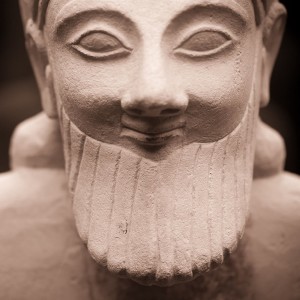
5. On the Periphery: Cyprus Between the Assyrian & Persian Empires with Christian Körner
 2022-08-02
2022-08-02
Let's start with the end in mind. The end of the fourth century BCE was a tumultuous period in Cypriot history. According to Diodorus Siculus, "Ptolemy...crossed with an army from Egypt into Cyprus against those of the kings who refused to obey him." (Diod Sic 79.4) The ruler of Kition, Pygmalion, was put to death. King Praxippus of Lapethos was arrested. The city of Marion was razed. And King Nicocles of Paphos, seeing the writing on the wall, chose to hang himself. His wife, Axiothea, tragically killed her daughters and then herself before burning the palace down in defiance. Their deaths, among others, brought an end to the Cypriot City-Kingdoms and ushered in the Ptolemaic Age.
However, for centuries, the Cypriot City-Kingdoms (i.e., poleis) thrived on the periphery of Assyrian, and later, Persian rule. Though never truly "independent," Cypriot Kings skillfully wielded their political currency. But just how did they navigate the changing geo-political landscape? Let us be clear: Cyprus, as a whole, was never passive. In fact, these poleis were as dynamic as their rulers. City-Kingdoms forged and severed alliances; willfully provoked and pacified regional powers; and even dared to defy Achaemenid (Persian) will in the Eastern Mediterranean. In this month's episode, Christian Körner, from the University of Bern, discusses "Cyprus Between the Assyrian and Persian Empires."
More Episodes
 2023-04-15
2023-04-15
 574
574
 2023-03-15
2023-03-15
 618
618
 2023-01-02
2023-01-02
 1.5k
1.5k
 2022-11-15
2022-11-15
 5.5k
5.5k
 2022-10-15
2022-10-15
 681
681
 2022-09-15
2022-09-15
 531
531
 2022-08-15
2022-08-15
 724
724
Create your
podcast in
minutes
- Full-featured podcast site
- Unlimited storage and bandwidth
- Comprehensive podcast stats
- Distribute to Apple Podcasts, Spotify, and more
- Make money with your podcast
It is Free
- Privacy Policy
- Cookie Policy
- Terms of Use
- Consent Preferences
- Copyright © 2015-2024 Podbean.com




